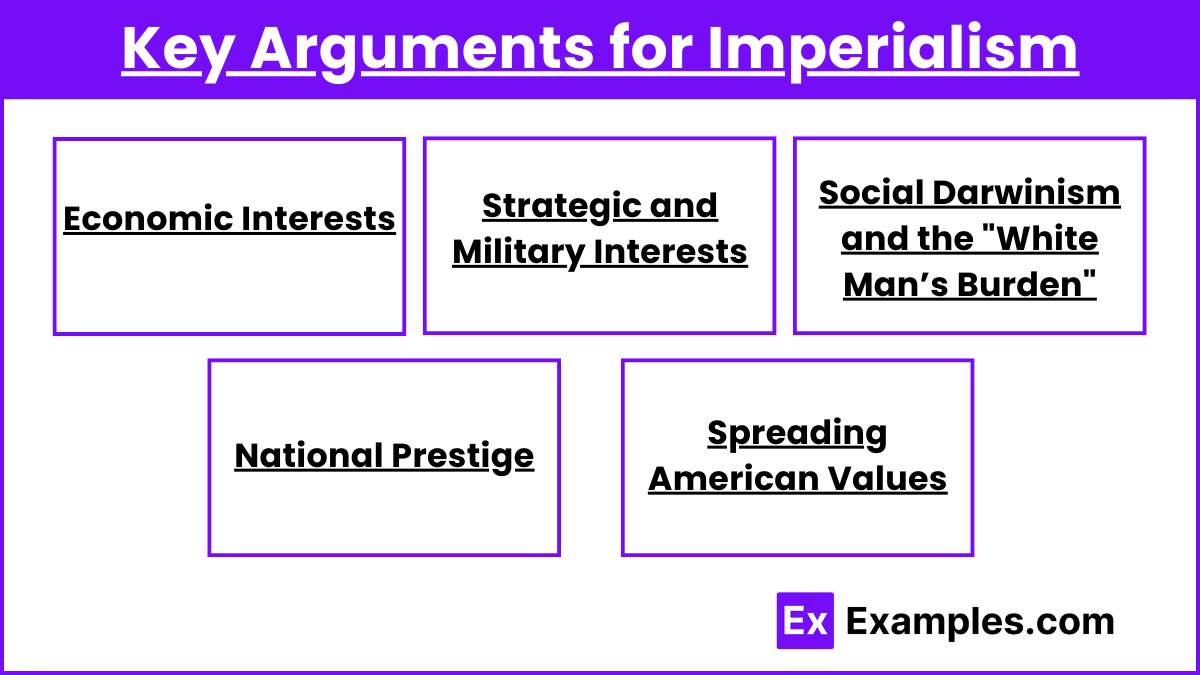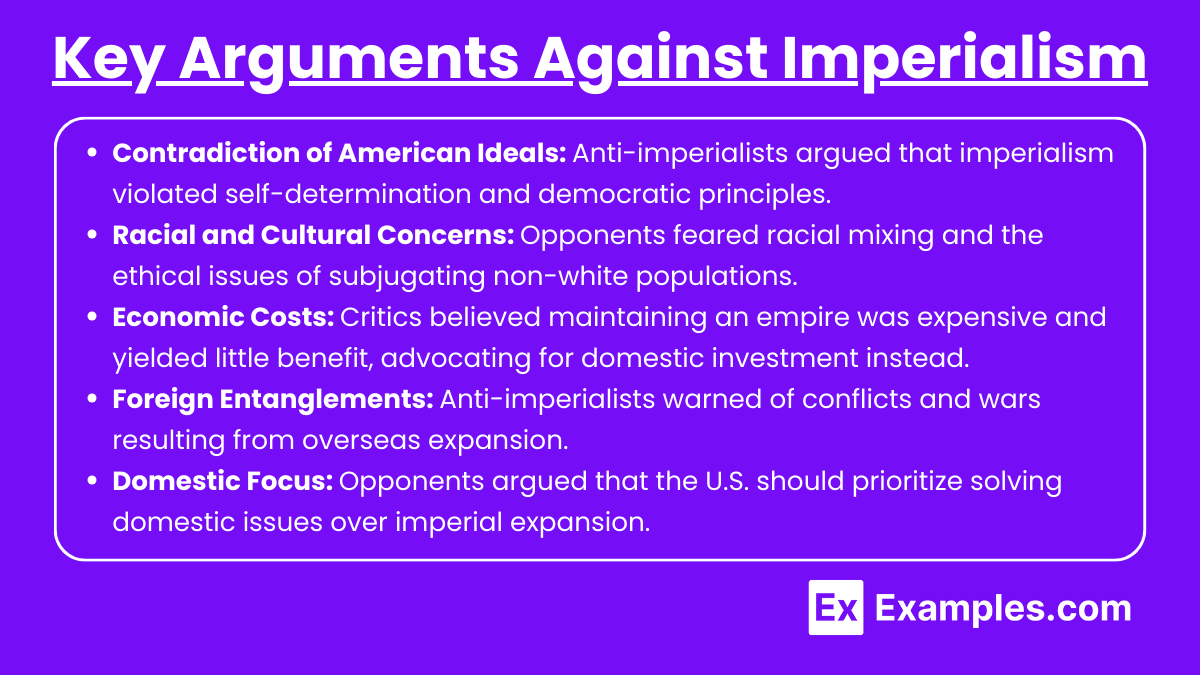In AP United States History, Debates Over Imperialism refer to the intense discussions at the turn of the 20th century about whether the United States should expand its influence beyond North America. Following the Spanish-American War in 1898, the U.S. acquired territories like Puerto Rico, Guam, and the Philippines, sparking debates about the nation’s role in global affairs. Supporters of imperialism argued for economic growth, national security, and spreading American values, while opponents contended that imperialism contradicted the nation’s democratic ideals and led to unnecessary foreign entanglements.
Learning Objectives
The learning objectives for the topic “Debates Over Imperialism” will include the ability to analyze the arguments for and against U.S. expansion at the turn of the 20th century. You will be expected to evaluate the economic, strategic, and ideological motivations behind imperialism, as well as the concerns about its impact on American democratic values. Additionally, you will be required to assess key events like the Spanish-American War and the consequences of U.S. territorial acquisitions on both domestic and international affairs.
Key Arguments for Imperialism

- Economic Interests:
- Advocates of imperialism believed that acquiring new territories would provide access to raw materials, new markets for American goods, and opportunities for investment. The desire to compete with European powers, who were also expanding their empires, drove economic arguments for imperialism.
- Strategic and Military Interests:
- Expansionists argued that controlling territories in strategic locations, such as the Philippines and the Caribbean, was vital for national security. The construction of naval bases and coaling stations would enable the U.S. to project power globally and protect its interests.
- Social Darwinism and the “White Man’s Burden”:
- Many imperialists believed in the concept of Social Darwinism, which held that stronger nations had a responsibility to dominate weaker ones. This idea was often coupled with the notion of the “White Man’s Burden,” the belief that Americans had a duty to civilize and Christianize the peoples of other lands.
- National Prestige:
- Imperialists argued that expanding America’s empire would enhance its global standing and demonstrate its status as a world power. The acquisition of territories would place the U.S. on equal footing with European imperial powers.
- Spreading American Values:
- Some supporters of imperialism believed that expanding American influence would spread democracy, freedom, and civilization to “backward” regions of the world. This belief was often tied to the missionary impulse to convert non-Christian populations.
Key Arguments Against Imperialism

- Contradiction of American Ideals:
- Anti-imperialists argued that imperialism violated the principles of self-determination and consent of the governed, which were central to the American Revolution. They believed that ruling over foreign peoples without their consent was antithetical to democracy.
- Racial and Cultural Concerns:
- Some opponents of imperialism feared that annexing territories with non-white populations would lead to racial mixing and dilute American culture. Others were concerned about the ethical implications of subjugating other races.
- Economic Costs:
- Critics argued that maintaining an empire would be costly, requiring a large military presence and investments in infrastructure, while yielding little economic benefit. They believed resources would be better spent on domestic issues.
- Potential for Foreign Entanglements:
- Anti-imperialists warned that acquiring overseas territories would drag the U.S. into conflicts with other imperial powers and entangle the nation in foreign wars and disputes.
- Domestic Focus:
- Many opponents of imperialism believed that the U.S. should focus on addressing domestic problems, such as poverty, inequality, and racial tensions, rather than pursuing expansion abroad.
Examples
- Spanish-American War (1898): The war marked the beginning of U.S. overseas imperialism, resulting in the acquisition of Puerto Rico, Guam, and the Philippines.
- Annexation of Hawaii (1898): The U.S. annexed Hawaii, a key strategic location in the Pacific, furthering its imperial ambitions.
- Philippine-American War (1899-1902): A conflict between Filipino nationalists and U.S. forces, sparked by the U.S. decision to annex the Philippines rather than grant it independence.
- Anti-Imperialist League: Formed in 1898, this organization included prominent figures like Mark Twain and Andrew Carnegie who opposed U.S. imperialism.
- Platt Amendment (1901): Gave the U.S. the right to intervene in Cuban affairs, effectively making Cuba a U.S. protectorate despite its formal independence.
MCQs
- What was a primary argument made by supporters of U.S. imperialism in the late 19th century?
- A) To promote isolationism
- B) To gain access to new markets and resources
- C) To reduce the size of the U.S. military
- D) To avoid conflicts with European powers
- Answer: B) To gain access to new markets and resources
- Explanation: Supporters of U.S. imperialism argued that acquiring new territories would provide access to raw materials, markets, and investment opportunities, essential for economic growth.
- Which event marked the beginning of U.S. overseas imperialism?
- A) The Louisiana Purchase
- B) The War of 1812
- C) The Spanish-American War
- D) The Mexican-American War
- Answer: C) The Spanish-American War
- Explanation: The Spanish-American War in 1898 marked the start of U.S. overseas imperialism, leading to the acquisition of territories like Puerto Rico, Guam, and the Philippines.
- Which organization was formed to oppose U.S. imperialism following the Spanish-American War?
- A) The Federalist Society
- B) The American Temperance Society
- C) The Anti-Imperialist League
- D) The Know-Nothing Party
- Answer: C) The Anti-Imperialist League
- Explanation: The Anti-Imperialist League was founded in 1898 by prominent Americans who opposed U.S. imperialism, arguing that it violated democratic principles.


